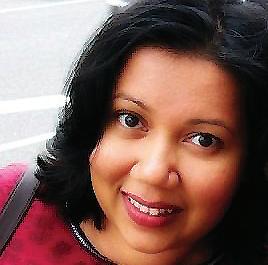
4 minute read
Living a game of hopscotch
from 2011-07 Melbourne
by Indian Link
BY SREEDHEVI IYER
understand the complications, and whether I’m bothered enough to make the effort. See, here’s the thing. I am Indian. I was also born and educated in Malaysia. And I now live in Australia. I am all these things, yet I am none of them.

I earn my bread and butter, it is invariably English. In Malaysia, it is a mix of Tamil and Malay. And in India, it is occasionally in Hindi. Which language would I ally myself with? None of them. They are like a brood of children whom you cannot pick a favourite from, but can only observe as they find their own skills to shine in growing up. I crave biryani when in Brisbane, I crave Shiraz when in Kuala Lumpur, I crave roti canai when in Chennai. Wherever I am, I get drawn to the other. And it goes beyond food. Sometimes it’s over something trivial, like missing dry winters when walking in the putrid heat of Mumbai. And sometimes it is something I have to hold in my heart in silence before I can figure out what it means - like the time I caught my own reflection in the Myer display window last Christmas, and
I resemble everyone but myself, and sometimes see in shop-windows, despite the well-known laws of optics, the portrait of a stranger...


I am Indian. I was also born and educated in Malaysia. And I now live in Australia. I am all these things, yet I am none of them
When my identity seems suspended like this, despite whichever culture I choose to take shelter in, the idea of home also inevitably becomes questionable. Is my home the one my parents live in, the one they built in the state of Kedah in Malaysia? Is it the limestone walls of the house in my father’s ancestral village in Kadayam, Tamil Nadu, a place that requires two trains and a bumpy taxi ride to get to? Or is it the brick apartment in Paddington that I bought for myself, cursing the mortgage but loving the jealous looks of my mates as I tell them my address over a couple of beers?
Perhaps some questions are yet to have answers. Given time, I can be comfortable in any of the settings above. If I had a choice, though, I would say that I can give up each of these places quite easily, and keep travelling, looking for new places, new shelters and new identities. Yes, there is a sense of loss in not being able to call one geographical location ‘home’. But the concept can be shifted. In a world where lowcost air travel has meant a greater fragmentation in the understanding of the world due to the increasingly myriad cultural perspectives, ‘home’ as a static entity may not really be relevant anymore.
What happens when someone goes from already being a hyphenated identity, to becoming one that is a double-hyphen?
What happens when you’re born with problems of home and identity, and then you choose (just for fun) to exacerbate it by moving again to a place that has no interest or claim on you?
I have very long answers to the very simple question, “Where are you from?” The answer also changes according to the person doing the asking, whether they have the patience for the convoluted truth, whether they have the capacity to
I speak three and a half languages and if you ask me which one I dream in (as a self-satisfying way of determining my real mother tongue) unfortunately the answer is, it changes according to the coordinates I find myself in. In Brisbane, where failed to recognise the brown-skinned girl looking back at me. In times like this, literature helps. An Indian writer, A.K. Ramanujan, a Fulbright scholar who lived in the United States in the ‘50s and ‘60s, seems to have had the exact same experience:
So perhaps ‘home’ is now an idea, a state of mind, rather than a place. Perhaps it is the sandalwood incense I always carry with me in my travels, making airline groundstaff nervous about combustible elements in my luggage. Perhaps it is in the books I read, about people who know how to cherry-pick from one culture to another and mesh them together to produce something new and unique. And perhaps it is in that space that Ramanujan himself had already figured out - that space situated just above the hyphen in ‘Indian - American’, the politically correct, linguistically awkward term that seemed closest in labelling, and thereby attempting to calcify something that is susceptible to mutation at any given moment. By that account, I actually have two spaces to inhabit, since I would have two hyphens to contend with. Indian - Malaysian - Australian. I’m probably hopscotching between the two, as and when I am among Aussies, or Indians, or Malays, or Chinese, or Filipinos, or...you get the idea.
I keep the hopscotch game going because this is now how I am, how I operate, how I interface with the world. And I am not alone, and whenever I meet other hopscotchers, it’s an instant feeling of recognition, knowing there are compatriots in this new, more offbeat journey. There is now far more to be said of the world, and thankfully, a double (or triple?) perspective on everything is both more complex, but also more fulfilling. Here’s to more of the world from unique vantage points.
BY SANDIP HOR

Travellers to hot and dusty east African wilderness often finish off their exhaustive, but mind-blowing safari experience by taking it easy for a few days in Zanzibar, the exotic Indian Ocean Island. I was no exception to this practiced routine.
Located almost 35 km off the shores of mainland Tanzania, Zanzibar boasts to be Africa’s most enticing destination, described by the 19th century Scottish explorer David Livingstone as the finest place he had ever









